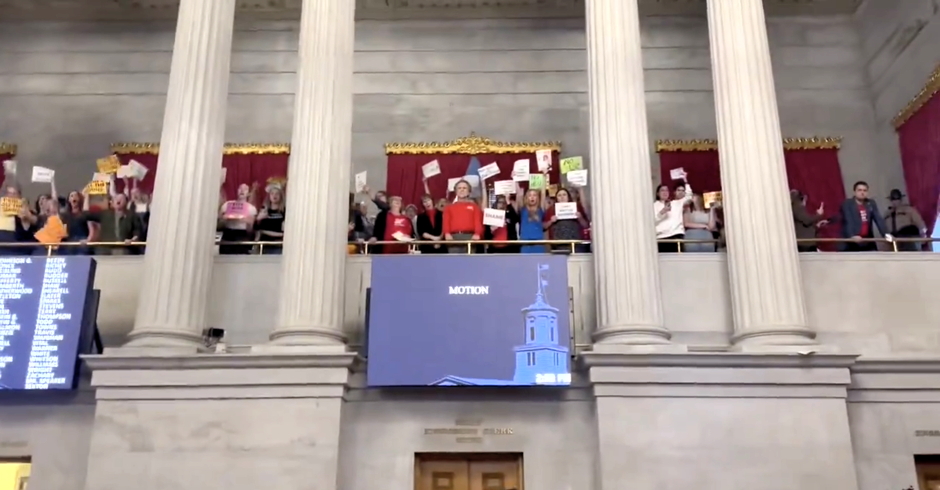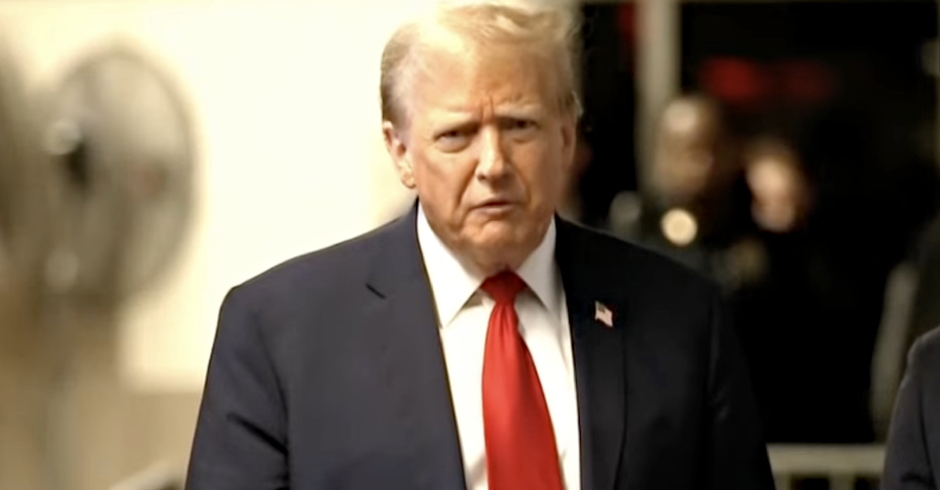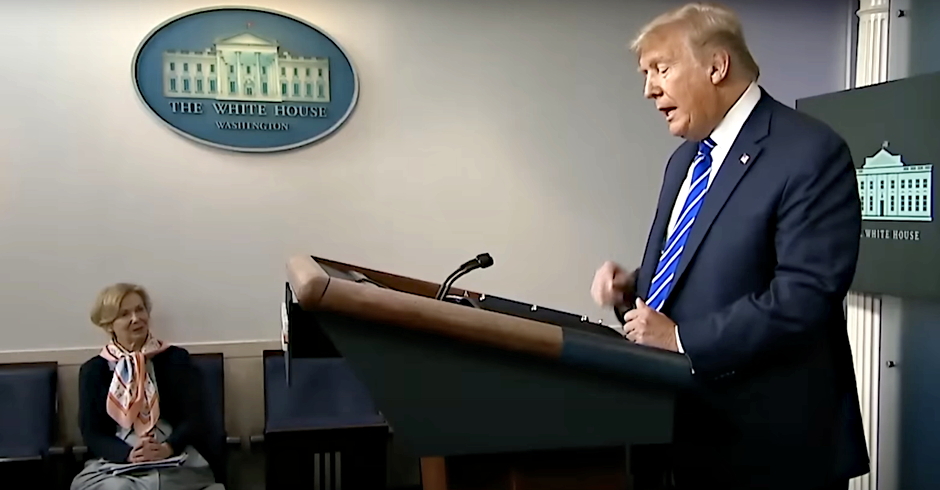BREAKING: Georgia Governor Says He Will Veto Anti-Gay ‘Religious Freedom’ Bill
Dozens of Major Corporations Urged Nathan Deal to Not Make Discriminatory Bill Law
Governor Nathan Deal has just announced he will veto HB 757, an anti-gay “religious freedom” bill that has been condemned by dozens of large multi-national corporation that do business in Georgia. Several warned they would leave the Peach State should the discriminatory bill become law, and over 500 companies joined Georgia Prospers, a coalition devoted to opposing discrimination.Â
Gov. Deal said he would have signed HB 757 had it remained in its original form, the Pastor Protect Bill. He noted that many oppose the bill, but repeatedly stated that there are no instances in Georgia that have happened that would require HB 757. And he pointed to the Founding Fathers, and mentioned the late Antonin Scalia’s theory of “negative protections,” suggesting the bill is overly broad.Â
But Deal also said he will not bow to threats, including those from the business community.Â
“I do not think we have to discriminate against anyone to protect the faith based community,” Deal said. “I believe it is about the character of of state, and the character of our people,” Deal said, announcing his veto.
“Their efforts to purge this bill of any possibility that it would allow or encourage discrimination illustrates how difficult it is to legislate something that is best left to the broad protections of the First Amendment,†he added.
The Atlanta Journal-Constitution notes Gov. Deal’s “planned veto will likely infuriate religious conservatives who considered the measure, House Bill 757, their top priority. This is the third legislative session they’ve sought to strengthen legal protections from opponents of gay marriage, but last year’s Supreme Court ruling legalizing same-sex weddings galvanized their efforts.”
“Already, prominent conservatives have vowed to revive the measure next year if Deal chooses not to sign it,” the AJC adds.
Georgia enjoys a $1.7 billion film and television industry. Many major studios and media conglomerates, including Disney, Time Warner, AMC, Viacom, and over the past week urged Gov. Deal to veto the bill. Some, including 34 entertainment industry giants, made clear they will pull their business out of the state should it become law. The NFL warned it might refuse to hold a Super Bowl in Georgia should the governor sign the bill into law.
The bill, HB 757, the so-called First Amendment Defense Act (FADA) is one of dozens of so-called “religious freedom” bills that incorrectly often claim to “mirror” the federal Religious Freedom Protection Act, that have been pushed in state legislatures across the nation. They are all direct responses to the legalization of same-sex marriage.
In addition to restating the First Amendment right that pastors and other religious clerics cannot be legally forced to solemnize any marriage which they oppose, HB 757, sponsored by GOP Senator Greg Kirk, would have provided legal cover for “faith based organizations” to refuse services “that violate such faith based organization’s sincerely held religious belief.” It would have allowed them to refuse to “rent, lease, or otherwise grant permission for property to be used by another person for an event which is objectionable to such faith based organization.”
UPDATE I:
Gov. Deal has published his full remarks on his website:
The decision surrounding HBÂ 757 has generated more intense feelings that most legislation, perhaps because it has highlighted the concerns of many in our religious communities regarding the actions of federal courts, especially the United States Supreme Court in its 5-4 opinion last summer which legalized same sex marriage. (Obergefell v. Hodges, 576 U.S. ____(2015)).
HBÂ 757 enumerates certain actions that religious leaders, faith-based organizations and people of faith shall not be required to take or perform. These include solemnizing a marriage, attending such marriages, hiring church personnel or renting church property when such acts would be contrary to their sincerely held religious beliefs. While most people would agree that government should not force such actions, there has not been a single instance of such taking place in Georgia. If there has been any case of this type in our state it has not been called to my attention. The examples being cited by the proponents of this bill have occurred in other states that have very different laws than Georgia.
One example that is used is the photographer in New Mexico who refused to photograph a same sex marriage (Elane Photography, LLC v. Willock, 309 P. 3d53 (2013)). Â That state has a Religious Freedom Restoration Act, but it was not applicable. It was the New Mexico Human Rights Act that determined the results in that case. Georgia does not have a Human Rights Act.
The second case that is cited is that of the bakery in Colorado that refused to bake a wedding cake for a same sex couple. There the court ruling was based on Colorado’s Public Accommodation Act which prohibited discrimination based on sexual orientation (Craig v. Masterpiece Cakeshop, Inc. ____ P 3d_(2015)). Georgia does not have a Public Accommodation Act.
Therefore, as I have examined the protections this bill seeks to provide to religious organizations and people of faith I can find no examples that any of the things this bill seeks to protect us against have ever occurred in Georgia. It is also apparent that the cases being cited from other states occurred because those state had passed statues that specifically protected their citizens from adverse actions based on their sexual orientation. Georgia has no such statues. Â
HB 757 appeared in several forms during the recent session of the Georgia General Assembly. I had no objection to the “Pastor Protection Act†that was passed by the House of Representatives. The other versions of the bill, however, contained language that could give rise to state sanctioned discrimination. I did have problems with that and made my concerns known as did many other individuals and organizations, including some within the faith based community.
I appreciate the efforts of the General Assembly to address these concerns and my actions today in no way disparage their motivations on those who support this bill, Their efforts to purge this bill of any possibility that it will allow or encourage discrimination illustrates how difficult it is to legislate on something that is best left to the broad protections of the First Amendment of the United State Constitution.
That may be why our Founding Fathers did not attempt to list in detail the circumstances that religious liberty embraced. Instead, they adopted what the late Supreme Court Justice Scalia referred to as “negative protection.†That is, rather than telling government what it can do regarding religion, they told government what it could not do, namely, “establish a religion or interfere with the free exercise thereof.†They had previously proclaimed in the Declaration of Independence that Man’s Creator had endowed all men “with certain unalienable rights,†including “Liberty†which embraces religious liberty. They made it clear that those liberties were given by God and not by man’s government. Therefore, it was unnecessary to enumerate in statue or constitution what those liberties included.
In light of our history, I find it ironic that today some in the religious community feel it necessary to ask government to confer upon them certain rights and protections. If indeed our religious liberty is conferred by God and not by man-made government, we should need the “hands off†admonition of the First Amendment to our Constitution. When legislative bodies attempt to do otherwise, the inclusions and omissions in their statues can lead to discrimination, even though it may be unintentional. That is too great a risk to take.
Some of those in the religious community who support this bill have resorted to insults that question my moral convictions and my character. Some within the business community who oppose this bill have resorted to threats of withdrawing jobs from our state. I do not respond well to insults or threats. The people of Georgia deserve a leader who will made sound judgments based on solid reasons that are not inflamed by emotion. That is what I intend to do.
As I’ve said before, I do not think we have to discriminate against anyone to protect the faith based community in Georgia of which my family and I are a part of for all of our lives. Our actions on HB 757 are not just about protecting the faith-based community or providing a business-friendly climate for job growth in Georgia.
This is about the character of our State and the character of its people. Georgia is a welcoming State filled with warm, friendly and loving people. Our cities and countryside are populated with people who worship God in a myriad of ways and in very diverse settings. Our people work side by side without regard to the color of our skin, or the religion we adhere to. We are working to make life better for our families and our communities. That is the character of Georgia. I intend to do my part to keep it that way.
For that reason, I will veto HBÂ 757.
Â
Â
This is a breaking news and developing story. Details may change. This story will be updated, and NCRM will likely publish follow-up stories on this news. Stay tuned and refresh for updates.
Â
Image: Screenshot of Gov. Deal via his video announcement

Enjoy this piece?
… then let us make a small request. The New Civil Rights Movement depends on readers like you to meet our ongoing expenses and continue producing quality progressive journalism. Three Silicon Valley giants consume 70 percent of all online advertising dollars, so we need your help to continue doing what we do.
NCRM is independent. You won’t find mainstream media bias here. From unflinching coverage of religious extremism, to spotlighting efforts to roll back our rights, NCRM continues to speak truth to power. America needs independent voices like NCRM to be sure no one is forgotten.
Every reader contribution, whatever the amount, makes a tremendous difference. Help ensure NCRM remains independent long into the future. Support progressive journalism with a one-time contribution to NCRM, or click here to become a subscriber. Thank you. Click here to donate by check.
 |


















